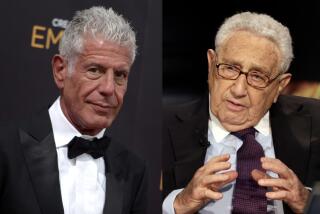Management of Foreign Policy
- Share via
The column by Robert Parry and Peter Kornbluh (“Misleading Americans,” Opinion, Sept. 11) is based on conjectures, innuendoes and distortions, with a smattering of facts, woven together in a conspiracy theory which may make good fiction, but it is not responsible journalism. The thesis that the late CIA Director William Casey orchestrated the creation of a domestic covert propaganda mechanism to proselytize the American people lacks any truth. This article is based on an unproven thesis developed by a dissident congressional staffer who tried unsuccessfully to sell the idea to the Iran-Contra Congressional Joint Investigating Committee.
The public is being asked to believe that a Republican minority was successful in suppressing this information. That makes no sense. The majority could have put through what they wanted. The committee rejected the thesis not for procedural grounds but because it lacked credibility and substantiation.
The Parry-Kornbluh article makes several outrageous charges concerning Vice President George Bush. Although the vice president was not directly involved in any aspect of public diplomacy management, he contributed one of the outstanding public diplomacy accomplishments of the Reagan Administration. In January, 1983, when our ability to deploy INF missiles in Europe was hanging by a thread, he personally traveled to Europe and met with the leaders of six West European countries. The subsequent deployment was, to a considerable degree, a product of the vice president’s successful public diplomacy efforts.
The Parry-Kornbluh attack criticizes the Reagan Administration effort to strengthen the ability of the United States government to communicate more effectively its major foreign policy views to foreign and domestic audiences. This is a legitimate and constructive role of government which has been exercised by other Presidents and which any Administration should practice. The Administration provided solid factual information to domestic and foreign audiences so that Central American issues could be understood and the policy debate could be conducted on a level playing field. This is no different than President Carter’s efforts to generate popular support for the Panama Canal Treaty.
There are several specific allegations in the article which are false. By tying a series of unrelated activities they have spun a complex conspiracy thesis which is not true. These points include:
- Individuals detailed to the National Security Council are not “moles” from other agencies. Each individual reports exclusively to the NSC and serves the President. The Parry-Kornbluh charge impugns the integrity of many fine officers who have served the NSC. The charge that I was detailed by Bill Casey to construct a domestic propaganda operation is scandalous and false.
Further, the vice president’s office was not involved in my selection. Shortly after joining the National Security Council in July, 1982, I cut all ties with the CIA. At no time during my five years with the NSC did I receive any instructions or orders from Casey or any other CIA official. My efforts were to strengthen our country’s ability to communicate openly and effectively around the world.
- Ambassador Otto Reich, director of the Office of Public Diplomacy for Latin America and the Caribbean, was not recommended or selected by me although I have a very high regard for his professional competence.
- To suggest that Lt. Col. Oliver North was my chief operations officer is fantasy. I had no responsibility for whatever activities North may have been pursuing. The only purpose to be served by tying North’s activities to legitimate and essential public diplomacy efforts would be to tarnish the public diplomacy structure of the Administration.
Information is a vital element in the conduct of foreign policy as much as full disclosure and truth are vital to a free society. Just as a free and inquiring press needs to play a key role, so does the government in an open, candid, and honest manner. I would hope the next Administration will continue to strengthen its public diplomacy capability.
The explosion in international communications technology and the emergence of new aggressive world leaders who understand the importance of effective communications, such as Soviet leader Mikhail Gorbachev, reinforce the need for a strengthened public diplomacy capability. This is no time to be silent about our policies and beliefs.
WALTER RAYMOND
McLean, Va.
(Raymond served on the NSC staff from 1982-1987.)
More to Read
Get the L.A. Times Politics newsletter
Deeply reported insights into legislation, politics and policy from Sacramento, Washington and beyond. In your inbox twice per week.
You may occasionally receive promotional content from the Los Angeles Times.










